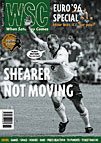 A view on the media and public reaction in France to Euro '96. Neil McCarthy reports
A view on the media and public reaction in France to Euro '96. Neil McCarthy reports
Two big news stories in France before Euro ’96 were Mad Cow Disease and the arrest of football hooligans in Birmingham and Newcastle. Some suggested that the shaky relationship between Britain and the rest of Europe coupled with England’s hooligans were a recipe for trouble.
As it turned out, Euro ’96 was seen as a ‘friendly’ competition in which the French media were won over by the fervent but well-behaved English and Scottish fans. The Mad Cow scandal died down, too, although the French team travelled around England with their own supply of steaks and roast beef in the team bus.
Elimination by the Czech Republic in the semi-finals was met with great disappointment, but so was the performance of the team who abandoned their recently-discovered attacking style. France returned instead to the dour tactics that saw them eliminated from the World Cup qualifiers by Bulgaria in 1994. Ironically, it was against Bulgaria that they had their best game – the only match before which pundits, players and fans voiced fears of defeat.
Appointed after France’s failure to qualify for the last World Cup, the semi-final defeat was Aimé Jacquet’s first as manager and, despite some criticism, he is likely to stay on in his post until after the World Cup.
Jacquet has been forthright in blaming himself for the poor performances, as has Zinedine Zidane who has been a shadow of his usual self since a car accident in early June. On a brighter note, Euro ’96 saw the discovery of Lilian Thuram as a top international defender and it also confirmed the talents of Desailly, Deschamps and Karembeu.
One of the foreign players who most impressed French press and players was Paul Gascoigne. Meanwhile, French television’s most useless commentator, Pierre Sled, wondered why European teams didn’t have more central defenders like his favourite player – Tony Adams!
The player the French press most loved to hate was Stoichkov, whose niggling of Desailly during the France v Bulgaria match ranged from shirt pulling to racial abuse. The evening news programme suggested that the sticky tape across the noses of many Bulgarians could have been better used a couple of inches further down in Stoichkov’s case, across his mouth.
Desailly’s own reaction was stoic, he explained that many players try to wind you up with what they think will have an effect, “You just have to ignore it and get on with the game,” he said. His reaction to the racist attack on the French team by extreme-right wing leader Jean Marie Le Pen (who said, among other things, “I find it artificial to bring players from abroad and call them the ‘French’ team.”) was in the same vein: “I’ve got my own opinion on him but, sorry, I’m not going to give you a reaction.”
The Le Pen incident created an outcry and possibly covered more newspaper column inches than the football over a couple of days, but in general Euro ’96 was appreciated for the quality of the football. It is now seen as a positive step forward for France in preparation for the World Cup in 1998, an important lesson for players and manager alike.
From WSC 114 August 1996. What was happening this month